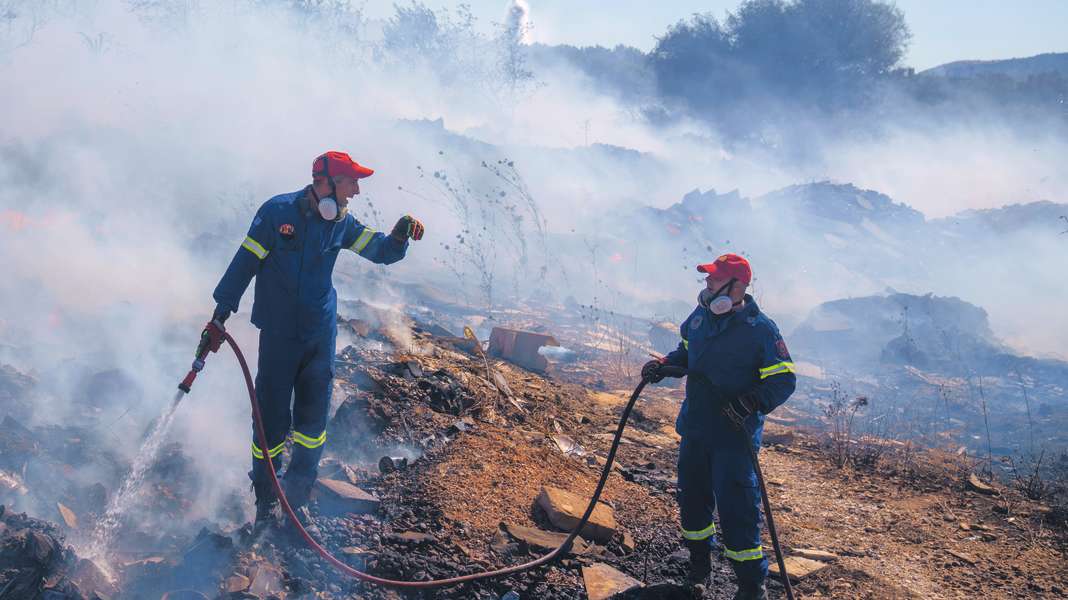Yacht law: Careless behaviour by the crew - who is liable in the event of unintentional environmental damage?
Boote Exclusiv
· 09.09.2024

Not so long ago, the Greek A pine forest caught fire on the island of Hydra - presumably because the crew of a yacht had set off fireworks for their guests. The sparks ignited the dry vegetation on the island and caused the forest fire. The fire brigade was only able to get the fire under control by using helicopters. The outrage among the locals on the island, and not only among them, was huge.
This situation provides an opportunity to shed light on who is liable for environmental damage and under what circumstances. Even if not every case is as crazy as the one that allegedly took place off the island of Hydra - in practice, environmental damage of varying degrees of severity occurs comparatively often. It is conceivable, for example, that oil escapes from a yacht for (initially) unknown reasons. It also happens that an impending visit by the owner causes the crew to clean the yacht with detergent in such a way that the harbour basin is transformed into a sea of bubbles a short time later.
The general question is the same in all factual constellations: Who is liable to whom and why (or: why not)?
In principle, a distinction must be made between civil and criminal liability. In addition, liability under public law must be taken into account. In the context of civil liability, the question arises as to who is liable to the injured party for the damage to (private) property. Criminal law provisions regulate whether one of the parties involved has committed a criminal offence. The provisions of public law answer the question of whether the damaging behaviour has violated public environmental laws.
The principle of fault applies in the context of civil liability. This basically means that a tortfeasor only has to fear claims for damages under civil law if he has caused damage negligently or intentionally. However, under certain circumstances, the tortfeasor must accept responsibility for the actions of third parties. This is because he is liable within the scope of his contractual liability for his vicarious agents and within the scope of tortious liability for his vicarious agents. The owner of a yacht is therefore liable under certain circumstances for the actions or omissions of those persons whose services he uses to fulfil his obligations, for example the captain. In order to exclude such liability for third parties from the outset, it is not uncommon to hold ownership of a yacht only indirectly, i.e. via an owner's company. Depending on the nature of the company, personal liability can be excluded or at least limited. For precisely these reasons, owners typically do not hire the crew themselves. Instead, they use a crew agency. The agency, not the owner, is then liable for errors in the selection of crew members.
The polluter pays principle
In contrast to fault-based liability under civil law, liability under public law for environmental damage is characterised by the polluter-pays principle. The polluter - not the general public - should be liable for the environmental damage that has occurred ("polluter-pays principle"). Consequently, direct causation, rather than fault or the degree of fault, is the decisive factor. There are numerous national and international regulations for the protection of the environment. What they all have in common is the protection of legal interests that are not assigned under private law. The Environmental Damage Act (USchadG), which was created in Germany to implement the European Directive 2004/35/EC, standardises environmental damage in Section 2. Such damage is deemed to have occurred if species and natural habitats (Section 19 BNatSchG), bodies of water (Section 90 WHG) or the soil have been damaged due to impairment of soil functions (Section 2 (2) BBodSchG). According to Section 2 (2) USchadG, the person responsible is "any natural or legal person who [...] has directly caused environmental damage or the imminent threat of such damage".
Criminal law sanctions punishable behaviour. In German law, for example, anyone who "sets fire to another person's forest" is punished with a prison sentence of one to ten years (Section 306 StGB). Anyone who pollutes a body of water without authorisation or otherwise adversely alters its characteristics can face a prison sentence of up to five years or a fine (Section 324 StBG).
Issues in which environmental damage has occurred need to be analysed
Against the background of this legal starting position, we must now analyse cases in which environmental damage has occurred. Let's start with the yacht whose crew is suspected of having caused a forest fire on the island of Hydra by setting off fireworks. There are allegations of arson. Not surprisingly, the crew of the yacht was arrested immediately after arriving in the next harbour after the alleged crime. In Greece, the offence of arson is also punishable by up to ten years in prison - even for negligence. The criminal investigation will show whether the crew members have committed a criminal offence. If the investigation ends with a criminal conviction, the crew will also be liable under civil and public law. This is because anyone who violates a law intended to protect another person is obliged to compensate the other person for the resulting damage.
Read also:
Case study: Oil leak
The legal situation is less clear in the event of an oil leak for initially unknown reasons. Depending on where the yacht was at the time of the oil spill, liability under the relevant public environmental protection laws may initially be considered. Internationally relevant would be the "International Convention On Civil Liability For Oil Pollution Damage", which primarily assigns liability to the polluter. As soon as the cause of the oil spill is established, various parties may be liable to pay compensation. It is conceivable, for example, that the manager of the yacht did not ensure that certain precautionary measures were taken. In this case, he, not the owner, would be liable. Inadequate maintenance cannot be ruled out from the outset either. It is also conceivable that the captain or the first engineer may have been at fault. In this case, these persons or the employer could be liable.
The captain who caused the bubbles in the harbour basin will almost certainly have violated public law regulations. At best, and depending on the exact accusation, it will be an administrative offence that may end with the payment of a fine. If the allegations are (more) serious, a criminal investigation will be launched on suspicion of water pollution. As part of these investigations, it will then be necessary to examine exactly what the captain knew and did. If necessary, the investigations will then extend to other crew members, namely those who used the cleaning agent at the instigation of the master and allowed it to flow into the harbour basin. It is also possible that the captain acted at the owner's instigation. This could also make things uncomfortable and, above all, expensive for the owner.
Irrespective of the details of the particular situation, the aim should be to avoid serious defects and the associated environmental risks by continuously checking the condition of the yacht. The crew should also have the best possible training. If fireworks nevertheless occur, it is advisable to co-operate with the investigating authorities as best as possible with the immediate assistance of a lawyer.
Experts for all questions of yacht law

The yacht lawyers Dr Tim Schommer (tim.schommer@clydeco.com) and Dr Volker Lücke (volker.luecke@clydeco.com) have been advising yacht clients in Germany and abroad for over 18 years. They advise on the planning and construction phase, the purchase and sale, the owner structure, yacht operation including insurance, crewing and charter as well as the handling of damage and third-party claims.

